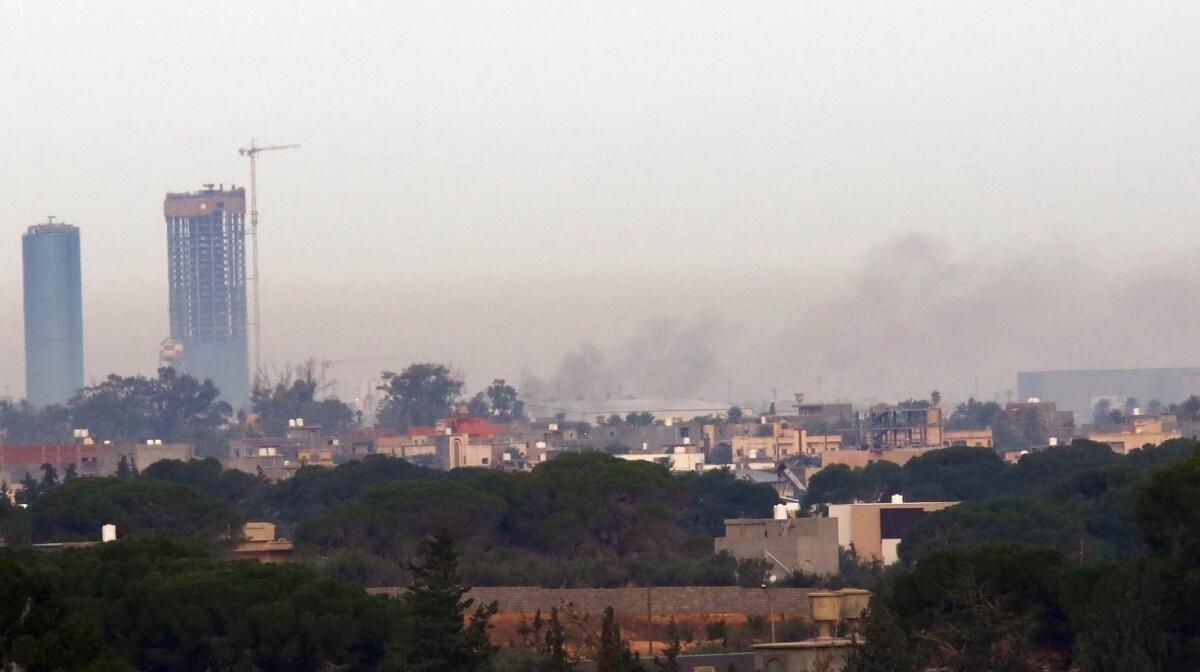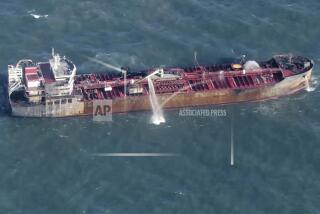Libya bombs Greek tanker, killing two and halting last air service

- Share via
The chaos afflicting Libya escalated Monday after the internationally recognized government conceded that it had bombed a Greek-owned oil tanker in a port city controlled by a militant group aligned with Islamic State extremists.
The apparently mistaken bombing late Sunday prompted Turkish Airlines, the only foreign carrier still flying to Libya, to suspend flights into the country, which has witnessed a dangerous escalation in fighting in recent weeks.
Libyan military spokesman Ahmed Mesmari said the Tobruk-based government had received no information about the tanker’s presence in Libyan territorial waters and “treated it as a dangerous and suspicious target that threatens national security,” the Associated Press reported.
“We regret the loss of lives,” Mesmari said, referring to the two crew members, a Greek and a Romanian, who were killed in the attack on the Liberian-flagged Araevo.
The Araevo, which was carrying 12,600 metric tons of oil, had been chartered by Libya’s state-owned National Oil Corp., the Greek Foreign Ministry reported in a statement. It said the vessel had 26 crew members — 21 Filipinos, three Greeks and two Romanians.
The bombing followed a recent spate of kidnappings and killings of Egyptian workers in Libya, where rival militias have been fighting for power since the October 2011 ouster and killing of longtime Libyan strongman Moammar Kadafi.
Egyptians seeking work and escape from their country’s economic disaster have become particular targets of the more radical Muslim militias, including the Islamic State-allied militants based in the eastern city of Derna. Islamic State has terrorized much of the Middle East in a spree of bombings and beheadings and last year proclaimed a Muslim caliphate in the vast territory it occupies in Iraq and Syria.
French President Francois Hollande called on the United Nations to address the spiraling violence consuming Libya and spreading arms and insurgents to the former French colonies of the Sahel region of northern Africa.
“We are making sure to contain the terrorism that took refuge there, in southern Libya. But France will not intervene in Libya because it’s up to the international community to take its responsibility,” Hollande said in an interview Monday with France-Inter radio.
French forces chased Islamic militants out of northern Mali two years ago and troops, armor and war planes are based in Niger’s capital, Niamey, to conduct surveillance and containment operations in those two Sahel countries as well as in Mauritania, Burkina Faso and Chad.
But Hollande made it clear that France will not act unilaterally in Libya, where U.S.-led forces helped then-united militias oust Kadafi.
Niger’s President Mahamadou Issoufou last week said his country feared further spread of violence from Libya and said halting it was impossible without international collaboration.
The speaker of Libya’s parliament, however, warned against any Western intervention, telling reporters at an Arab League meeting in Cairo on Monday that Libya would turn to Arab neighbors for help if needed.
“Foreign military intervention in Libya is rejected,” said Aqila Issa of the Tobruk-based leadership. “If we need any military intervention, we will ask our Arab brothers.”
Rival Islamist forces now control Tripoli, the modern capital of Libya, forcing the internationally recognized government bodies to relocate to the eastern city of Tobruk.
The Libyan air force waged airstrikes against the militants in Tripoli on Dec. 28, firing missiles at the city’s international airport that is now served only sporadically by a handful of regional airlines. The jets under the control of Gen. Khalifa Haftar, a leading figure in the 2011 revolution that broke Kadafi’s 42-year grip on power, also struck Libya’s largest steel plant and an air force academy near the former capital.
The European Union last month banned all seven Libyan airlines from operating in the airspace of the 28-nation bloc, citing concerns about the safety of the aircraft serving Libyan cities that have come under regular attack by the militants and government forces.
Turkey isn’t a member of the European Union and its national airline was the last offering service to Libya. Turkish Airlines indefinitely suspended flights to the embattled Libyan city of Misurata after Sunday’s bombing of the Greek tanker and said it was considering whether to resume service to Benghazi, Tripoli and Sabha.
Follow @cjwilliamslat for the latest international news 24/7
More to Read
Sign up for Essential California
The most important California stories and recommendations in your inbox every morning.
You may occasionally receive promotional content from the Los Angeles Times.













